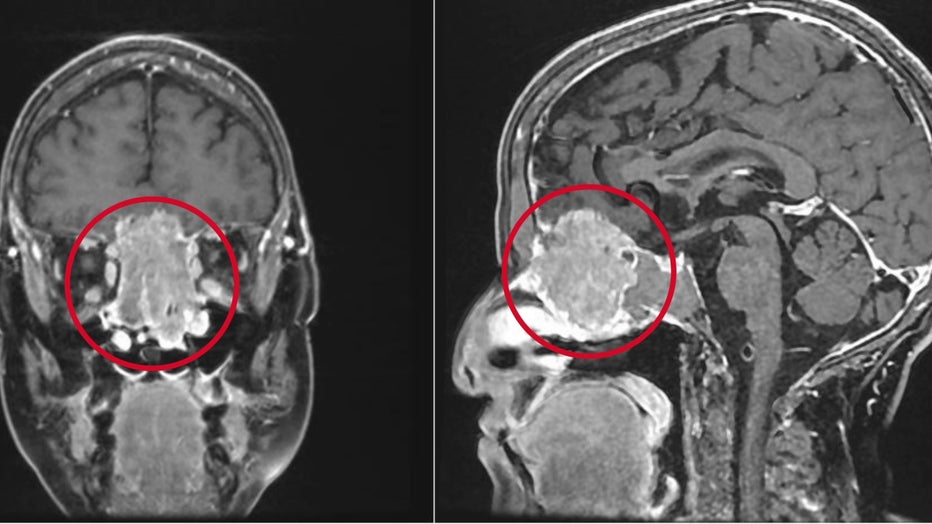Twin Cities woman celebrates defeat of rare brain cancer
Twin Cities woman celebrates defeat of rare brain cancer
Carol Brundieck walks through life with a smile and radiant attitude. She’s needed both during the past two years.
SOUTH ST. PAUL, Minn. (FOX 9) - Carol Brundieck walks through life with a smile and radiant attitude. She’s needed both during the past two years.
"I think it was huge," said Brundieck.
In late summer of 2021, Brundieck had a severe nosebleed after leaving work one night.
"Just out of the blue," she remembered. "You know, it was just all over. And I’m like oh, my gosh."
After a few weeks, there was another nosebleed. After the third, she was referred to an ear, nose, and throat specialist who suspected something was not right and took a biopsy of her upper nasal cavity. When the results came back the doctor left a message on Brundieck’s phone with the test results. She remembers the voicemail like it was yesterday.
"Oh, by the way, you have an esthesioneuroblastoma and my nurse will call you on Monday." She didn’t know what it was, but she knew it wasn’t good.
A subsequent scan of Brundieck’s head showed she had a tumor the size of an elongated egg growing behind her nose and in between her eyes.
"It’s really an uncommon tumor," said Dr. Jamie Van Gompel, a Mayo Clinic neurosurgeon.
The specific type of tumor is now called an olfactory neuroblastoma. It’s a type of cancer that starts in the smell receptors in the roof of the nose. Its existence is so rare that it affects as few as 300 patients a year.

The specific type of tumor is now called an olfactory neuroblastoma (Supplied)
"If you take those 300 patients per year, there might be less than five people diagnosed with the aggressive form that Carol has," explained Dr. Van Gompel. Carol’s tumor was so aggressive that it grew into the blood vessels of her brain.
While it’s not known how many cases are diagnosed and treated in closed societies such as China, in the rest of the world Mayo Clinic has conducted more research and treated more patients than any other institution according to Van Gompel.
At Mayo, each case is assigned a team of physicians and specialists. In Carol’s case, the team who performed the 13-hour operation to surgically remove her tumor consisted of Van Gompel, a nose specialist, an ophthalmologist, and a radiation oncologist. Throughout the operation, they kept testing tissue on the margins of the tumor to make sure it was cancer free.
"So, even though the cancer, they had physically removed it, there could be microscopic cells floating around in my head," recalled Carol of her treatment.
To destroy those latent cells, the Mayo team treated Carol with a pinpoint radiation device called the proton beam. The highly sophisticated instrument delivers a small concentrated beam of radiation to an exact point in the body without passing through the tissue behind it.
"The proton beam is important because it reduces the chance that she’ll have a secondary cancer or lose some memory or lose other functions because that energy doesn’t travel through the brain," said Dr. Van Gompel. In Carol’s treatment plan, doctors used the proton beam on her brain 30 times.
"I have not seen many patients like this patient," said Van Gompel, praising Carol for energy and disposition. "She is so special with her positive attitude all the time and her can-do attitude."
It is why Van Gompel and other Mayo staff members gathered to hear Carol ring a ceremonial bell at the Mayo campus after she completed her last cancer treatments.
"You’re just like, yea, you’re done," recalled Carol of the moment her husband and two children hugged her after she rang the bell three times.
For now, Carol is cancer free. She has returned to work part-time, and spends the rest with her family and her beloved dog Sophie, who her husband brought into the family to help with Carol’s recovery. Carol says the journey has been a lesson in enjoying life.
"I do enjoy that, and embrace that more," she said. Be happy, and make the most of it."
It’s an attitude that’s never been lost on her medical team.
"I don’t know what the future holds for Carol, but she holds a future in my mind as long as I’m alive because she is someone I’ll never forget," said Van Gompel.

